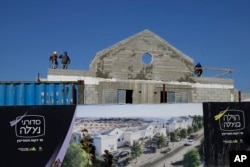Israeli Prime Minister Benjamin Netanyahu said Saturday that he would annex Israeli settlements in the occupied West Bank if he wins another term in office, a last-minute pre-election promise likely to enrage Palestinians and the Arab world.
In an interview with Israeli Channel 12 News three days ahead of the April 9 poll, Netanyahu was asked why he had not extended sovereignty to large West Bank settlements, as Israel did without international recognition in East Jerusalem and the Golan Heights, both captured in the 1967 Middle East war.
"Who says that we won't do it? We are on the way and we are discussing it," Netanyahu said.
"You are asking whether we are moving on to the next stage. The answer is yes, we will move to the next stage," he said. "I am going to extend [Israeli] sovereignty and I don't distinguish between settlement blocs and the isolated settlements."
Netanyahu is competing for votes with small far-right parties who advocate annexation. His comments are likely to appeal to hard-line voters, who object to ceding lands to the Palestinians.
'Settlements are illegal'
A spokesman for Palestinian President Mahmoud Abbas, Nabil Abu Rdainah, told Reuters: "Any measures and any announcements will not change the facts. Settlements are illegal and they will be removed."
The Palestinians want to establish a state in the West Bank, East Jerusalem and the Gaza Strip, all territory Israel captured in 1967. Israel has annexed East Jerusalem and withdrawn from Gaza. The West Bank remains under Israeli military occupation with limited Palestinian self-rule.
Settlements are one of the most heated issues in efforts to restart Israeli-Palestinian peace talks, frozen since 2014.
After decades of settlement building, more than 400,000 Israelis now live in the West Bank, protected by an Israeli military presence that divides some Palestinian communities and cuts off towns and villages with checkpoints.
The Palestinians and many countries consider this to be illegal under the Geneva Conventions that bar settling on land captured in war. Israel disputes this, citing security needs and biblical, historical and political connections to the land.
While vowing that he would not evacuate settlers from their homes, Netanyahu has also said in the past that the future of the settlements should be determined in peace talks with the Palestinians.
Eye on election
His remarks on Saturday were viewed in Israeli media as an attempt to draw right-wing votes rather than an immediate change of policy.
There was no immediate comment from the U.S. Embassy about Netanyahu's remarks, which followed a series of announcements and policy changes by U.S. President Donald Trump that were seen to favor Israel.
In March, Trump broke with decades of international consensus by recognizing Israeli sovereignty over the Golan Heights, territory Israel captured from Syria.
That followed his December 2017 decision to recognize Jerusalem as the capital of Israel, and to move the U.S. Embassy there. Both moves delighted Israel, infuriated Palestinian and Arab leaders, and were opposed by most U.S. allies.
U.S. officials have said they will unveil a long-awaited Trump administration Middle East peace plan after the Israeli election, but prospects to restart negotiations appear dim.
The Palestinians have been boycotting the Trump administration over its Jerusalem moves and other recent decisions they view as biased in Israel's favor.






